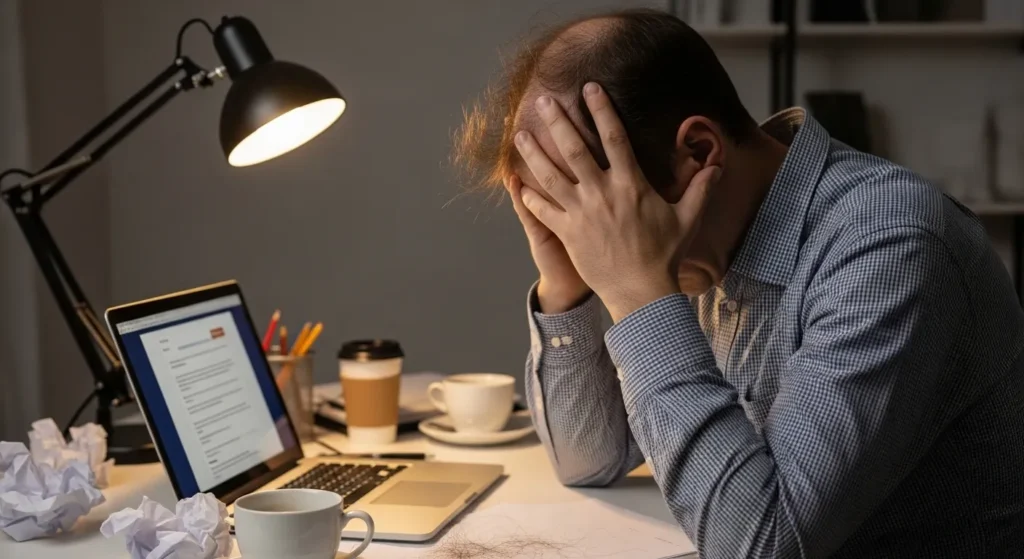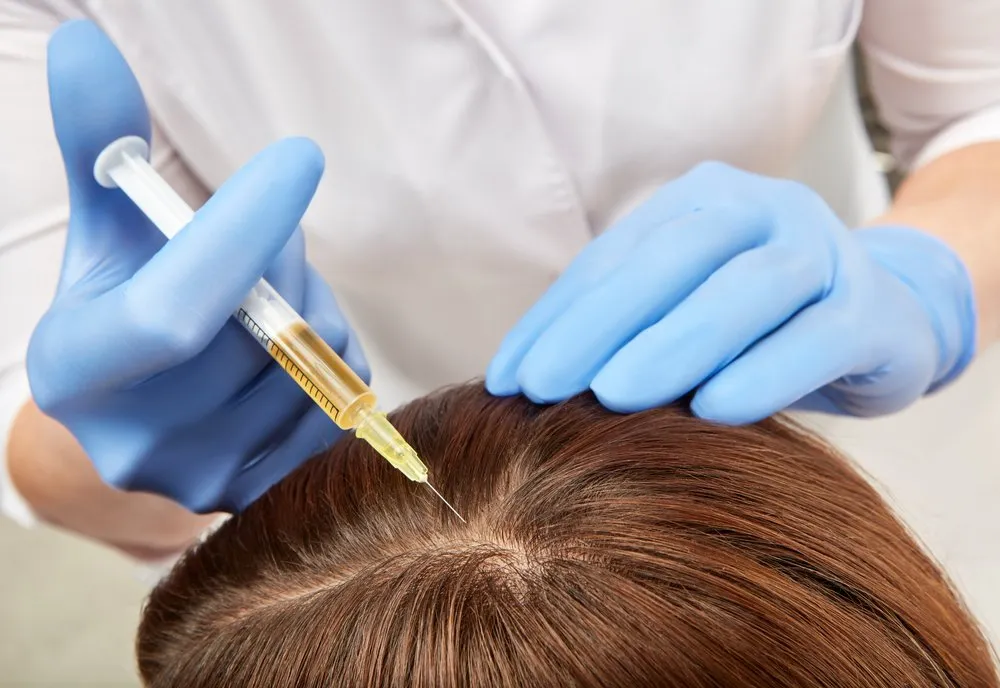Are you feeling tired and noticing hair loss at the same time? These symptoms can be connected and often point to deeper health issues like nutritional deficiencies, hormonal imbalances, or chronic stress.
This guide breaks down the common causes, what signs to look out for, and how to recover your energy and hair health. With expert-backed advice, treatment options, and recovery timelines, you’ll gain clarity and hope on your path to feeling better.
Understanding the Link Between Tiredness and Hair Loss

Are Fatigue and Hair Loss Connected?
Yes, these symptoms often go hand in hand. Your body is a complex system, and when something is off, like a lack of nutrients or hormone irregularity, it affects multiple functions, including your energy levels and hair growth cycles.
How the Body Signals Imbalance Through Hair and Energy Levels
Hair is not essential for survival, so when your body is under stress or lacking key nutrients, it may redirect resources away from non-essential functions like hair production. Likewise, low energy levels often stem from internal imbalances that also disrupt the hair growth cycle.
Common Causes of Fatigue and Hair Loss Together
Iron Deficiency Anemia
Low iron levels reduce oxygen transport in the blood, causing both chronic fatigue and hair thinning, especially in women. Iron is also essential for hair follicle cell growth.
Pro Tip: Ask your doctor for a ferritin test to check stored iron levels—not just hemoglobin.
Thyroid Disorders (Hypothyroidism & Hyperthyroidism)
Both underactive and overactive thyroids can cause fatigue and hair loss. Hypothyroidism is more commonly associated with dry, thinning hair and persistent exhaustion.
Chronic Stress and Adrenal Fatigue
High cortisol levels can trigger telogen effluvium, a condition where hair prematurely enters the shedding phase. Stress also drains your energy, affecting your sleep and focus.
Vitamin Deficiencies (B12, D, Zinc, Biotin)
- B12: Essential for energy production and red blood cell health.
- Vitamin D: Plays a role in the hair cycle and immune function.
- Zinc & Biotin: Critical for maintaining hair structure and cell turnover.
Hormonal Imbalances (PCOS, Menopause, Testosterone Drop)
- PCOS: Can lead to fatigue, hair thinning on the scalp, and unwanted facial hair.
- Menopause: Estrogen levels drop, affecting both energy and hair growth.
- Low testosterone: In men, this may reduce stamina and contribute to hair loss.
Poor Diet and Crash Dieting
Extreme calorie restriction deprives the body of essential nutrients. The result? Your hair sheds, and your energy crashes.
Autoimmune Conditions (e.g., Hashimoto’s, Lupus)
In autoimmune diseases, your immune system mistakenly attacks healthy cells—including hair follicles—while also causing systemic fatigue.
Lifestyle Factors That May Be Draining You and Damaging Hair
Sleep Deprivation
Without restorative sleep, your body can’t regenerate or manage stress, leading to both fatigue and hair shedding.
Overworking or Burnout
Mental exhaustion from constant work or caregiving can physically manifest as hair loss and chronic tiredness.
Poor Scalp Health and Hair Care Habits
Using harsh products, tight hairstyles, or skipping scalp hygiene may worsen hair thinning, especially when combined with fatigue-related issues.
How to Diagnose the Root Cause
Blood Tests to Ask Your Doctor For
- Complete Blood Count (CBC)
- Ferritin and Serum Iron
- Thyroid Panel (TSH, T3, T4)
- Vitamin B12 and D levels
- Hormonal Panel (Testosterone, Estrogen, Cortisol)
Checklist: Keep a journal of symptoms and bring it to your appointment.
When to See a Trichologist vs. an Endocrinologist
- Trichologist: Best for scalp and hair health-focused treatments.
- Endocrinologist: Ideal for investigating hormone or thyroid imbalances.
Tracking Symptoms and Patterns
Monitor:
- Timing of hair shedding (after illness, stress, or dietary change?)
- Energy dips (morning fatigue vs. afternoon crashes)
- Skin changes, mood swings, or sudden weight fluctuations
Treatment and Recovery Options
Correcting Nutritional Deficiencies with Diet or Supplements
- Iron: Lean meats, spinach, or iron supplements (with Vitamin C for absorption)
- B12: Eggs, dairy, or injections if deficient
- D & Zinc: Supplements or sun exposure + seeds/nuts
Stress Management Techniques for Energy and Hair Regrowth
- Meditation or breathing exercises
- Moderate exercise (like yoga or walking)
- Therapy or coaching for chronic stress
Medical Treatments (Thyroid Medication, Hormone Therapy)
Treatments like levothyroxine for hypothyroidism or hormonal birth control for PCOS can correct the imbalance and lead to improved energy and hair health.
Scalp Treatments and Hair Regrowth Plans
- PRP Therapy
- Minoxidil
- Microneedling
- Laser therapy
- Nutritional scalp serums

Recovery Timeline – When Will Hair Regrow and Energy Return?
What to Expect Week-by-Week
- Weeks 1–4: Lab tests & treatment plan begin
- Weeks 5–8: Energy gradually improves, hair shedding slows
- Weeks 8–12: Baby hairs or regrowth may appear
- 3–6 months: Noticeable improvement in thickness and stamina
Signs That Your Treatment Is Working
- Reduced hair fall in the shower or on the pillow
- Increased energy without caffeine
- Better sleep and clearer skin
When You May Need to Reevaluate Your Plan
- No improvement after 3 months
- New or worsening symptoms
- Unexplained weight gain or hair texture changes
When to Seek Professional Help
Red Flags You Shouldn’t Ignore
- Hair loss with extreme fatigue or dizziness
- Sudden or patchy hair loss
- Unexplained weight changes or cold sensitivity
How a Doctor Can Help Tailor Your Recovery Plan
A healthcare professional can:
- Interpret lab results accurately
- Provide custom treatment plans
- Monitor progress and adjust as needed
FAQs About Tiredness and Hair Loss
Is it normal to lose hair when tired?
Occasional tiredness won’t cause hair fall, but persistent fatigue linked to nutrient or hormonal imbalances can lead to shedding.
Can fixing my sleep alone stop hair fall?
Better sleep helps, but won’t reverse hair loss unless the root issue—like low iron or thyroid dysfunction—is also addressed.
Does iron or B12 work better for hair regrowth?
It depends on your deficiency. Iron is more linked to hair shedding, while B12 affects cell health and energy.
How long until hair grows back after correcting the cause?
Most people see visible regrowth within 3–6 months, but full recovery may take longer, depending on the severity and treatment adherence.
Final Thoughts
Fatigue and hair loss may seem like minor annoyances, but together they can point to serious underlying health conditions. The sooner you investigate the root cause, the faster you can restore both your energy and hair health. With the right diagnosis and treatment plan, full recovery is not only possible—it’s likely.
Concerned about fatigue and hair fall?
Book a consultation with Dr. Rana Irfan in Islamabad today for expert-led diagnostics and personalized treatment that gets to the root of the problem.
